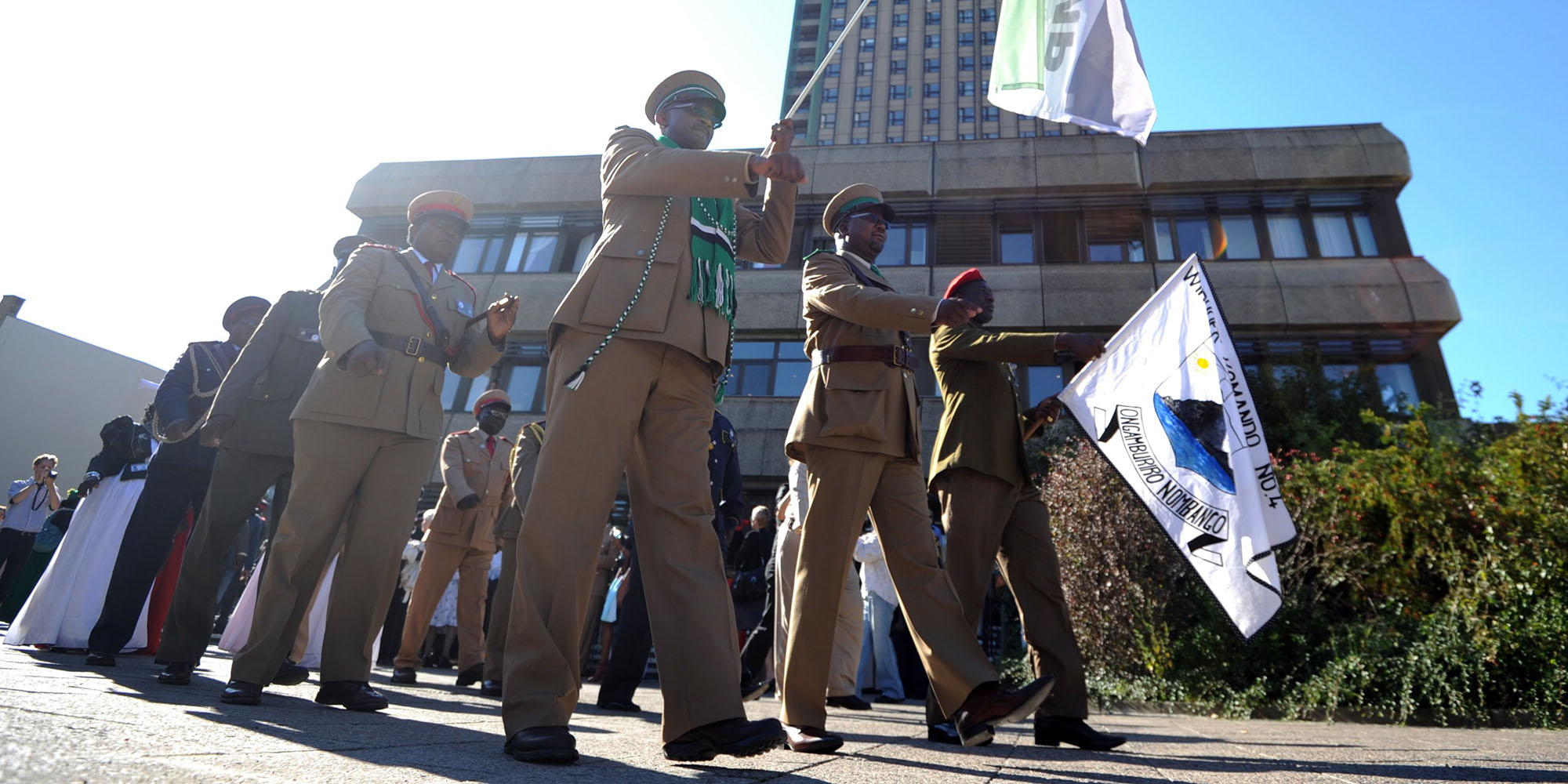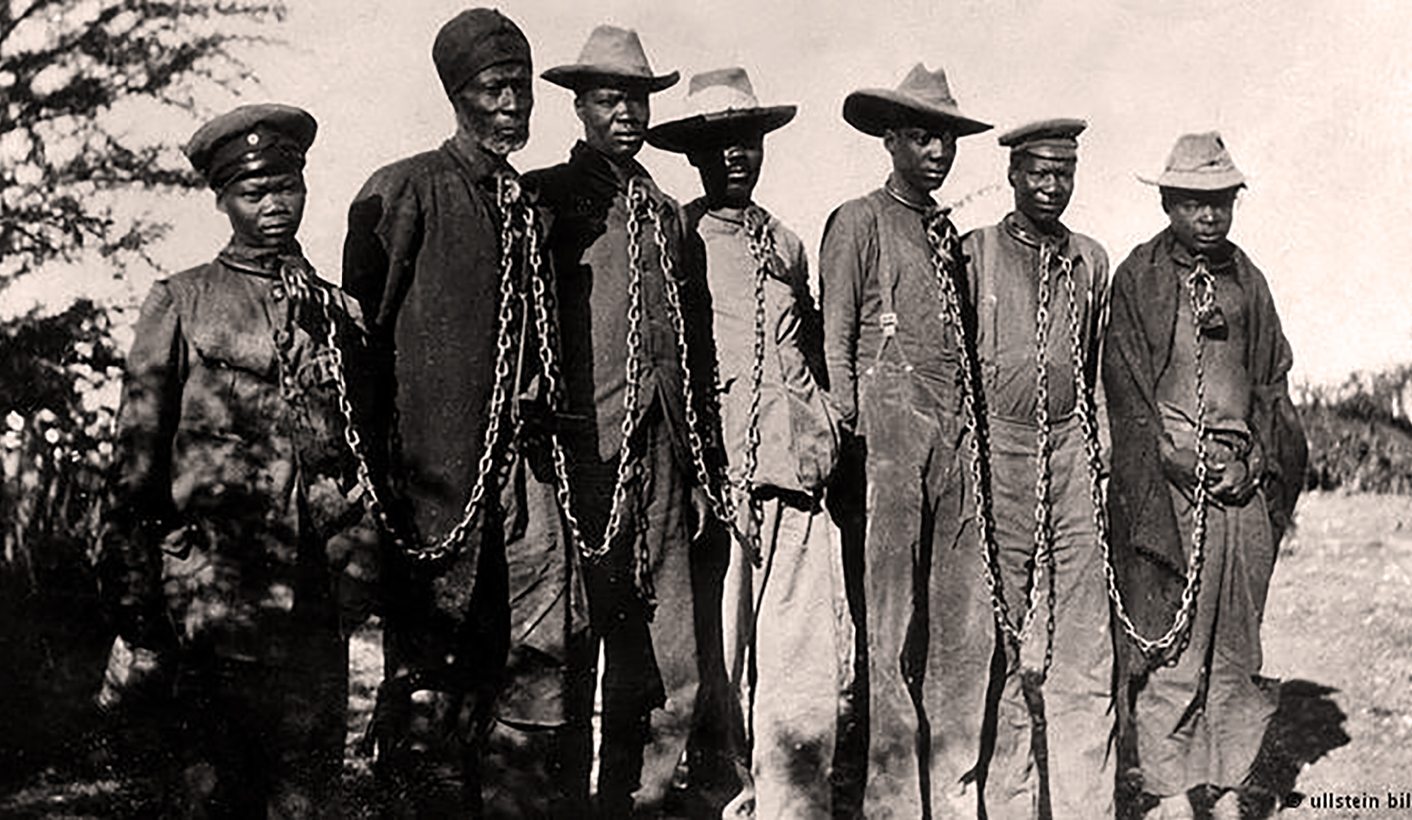When German Chancellor Angela Merkel pays President Cyril Ramaphosa an official visit today, 6 February 2020, talk will mostly be about business, development, and co-operation on the world stage. Germany’s efforts to address its colonial heritage might warrant a mention in passing, but such talk is mostly reserved for visits to neighbouring Namibia, where it left some deep scars. Although Germany’s colonial past is often underplayed, the slaughter of large parts of the population in former German South West Africa is often considered to have been the first genocide of the 20th century.
The numbers of the Herero and Nama were reduced from respectively 80,000 to 16,000 and 20,000 to 10,000 by 1908. David Olusoga and Casper Erichsen chronicled the massacres, which they compared to what later happened to the Jewish people, in their book The Kaiser’s Holocaust.
But when you try to find information about the genocide at the German History Museum – one of the most comprehensive in the country – staff will meekly point you to a special exhibition in 2017 on Germany’s colonial past. It was praised by some as a valiant effort at facing up to the country’s colonial history, but the exhibition has passed now.
Official recognition of the massacre as a genocide has been slow, possibly because it brings the complication of reparations. Some government leaders, like development minister Gerd Mueller during a visit to Namibia in September 2019, have called it a genocide. He also apologised.
 Members of the victims' organisation ‘Ovaherero/Ovambanderu — Council for Dialogue about the Genocide of 1904’ march up in front of the Charitee in Berlin, Germany, during a handover ceremony of 20 skulls to the organisation, on 30 September 2011. German soldiers murdered thousands of residents of the then colony of German Southwest Africa — many skulls of the killed were sent to Germany for scientists to use them for dubious race research. (Photo: EPA / Rainer Jensen)
Members of the victims' organisation ‘Ovaherero/Ovambanderu — Council for Dialogue about the Genocide of 1904’ march up in front of the Charitee in Berlin, Germany, during a handover ceremony of 20 skulls to the organisation, on 30 September 2011. German soldiers murdered thousands of residents of the then colony of German Southwest Africa — many skulls of the killed were sent to Germany for scientists to use them for dubious race research. (Photo: EPA / Rainer Jensen)
Legally though, it’s murky. A court case to decide the matter is still underway in the United States, where some museums are in possession of the bones of some of the victims sold to them by the Germans. German South West Africa wasn’t the only territory the Germans held. Others included German East Africa (what we now know as Tanzania and Rwanda), Cameroon and Togo.
Germany lost its colonies in 1919. This was a lot earlier than the other colonial powers and the 35 years it spent in Africa were short in comparison to others. But since then, what some academics describe as a “colonial amnesia” took hold in Germany.
 A human skull is displayed during a ceremony in Berlin, Germany, 29 August 2018. The German government handed back human remains from Germany to Namibia following the genocide from 1904 to 1908 against the Herero and Nama. (Photo: EPA-EFE / Hayoung Jeon)
A human skull is displayed during a ceremony in Berlin, Germany, 29 August 2018. The German government handed back human remains from Germany to Namibia following the genocide from 1904 to 1908 against the Herero and Nama. (Photo: EPA-EFE / Hayoung Jeon)
Jürgen Zimmerer, professor of global history at the University of Hamburg and head of its research centre on colonial legacy, says Germany’s colonial history was overtaken by other big historical events, such as the world wars and the Holocaust.
“There were also traces of colonial nostalgia,” he says, “that is, after 1945 people used the allegedly ‘good German colonialism’ as an argument against the victorious Western powers, and demanded that, just as Germans were forced to confront the Holocaust, those powers should confront their colonial atrocities. Not many wanted to acknowledge that Germans were implicit in colonial crimes as well,” he says.
To this day there is a general perception that Germany was a more benign colonial power and much less severe than, say, the English and the French.
Years after Germany bade farewell to its last colonies, Nazi leader Adolf Hitler had renewed ambitions. He wanted to establish a large African empire from Senegal to Somalia. This ambition remained a dream, and besides, the Holocaust overshadowed everything from that point onward.
Berlin Postkolonial’s Christian Kopp says there is an upside.
“Today, the early breakdown of the German colonial empire in 1919 rather seems an advantage, as after 100 years Germans are less directly involved [in those former colonies] and therefore more willing it seems, to take a critical look at their ancestors’ crimes than people in Britain, France, Spain or Belgium.”
Germany also played host to one of the most significant – and troublesome – events in Africa’s recent history. At the Berlin Conference, held in 1884, Africa was chopped to pieces by imperial Western powers and not one African was invited to take part or observe. There’s little physical testament in Berlin about this event.
The Palais Schulenburg, later the Reich Chancellery, where the conference was held, was destroyed at the end of World War II, and part of the Foreign Affairs Ministry today stands on the site — Wilhelmstrasse 77. A lone information board informs the visitor of what happened there more than 135 years ago.
“Remembering, reconciling. Bearing united responsibility for our future,” the English heading reads, next to a colourful map of Africa in 1914 indicating the parts of the continent which went to, respectively, Belgium, Britain, Germany, France, Italy, Portugal and Spain.
The board informs the reader that the German Chancellor, Otto von Bismarck, invited European and overseas powers with a presence in Africa to take part.
“Bismarck’s intention was to mitigate conflict and to find resolution through multilateral agreement. In the foreground of his politics, rather than the splitting-up of Africa, stood the reconciliation of European and non-European superpower interests,” the board reads. “The result was an efficient colonisation through the mutual acceptance of colonial powers.”
An opportunity to properly acknowledge and memorialise Germany’s colonial history has presented itself with the planned opening in 2020 of the Humboldt Forum, a new museum in Berlin which has been described as Germany’s equivalent of the British Museum or the French Louvre. It is set to house “world-famous collections featuring more than 20,000 exhibits from Asia, Africa, the Americas and Oceania”. The building is a replica of the Baroque-style Berlin Palace, or Stadtschloss, home of Prussian kings and German emperors since the 15th century, which was destroyed in 1945.
Critics of the Humboldt Forum say it could be done differently. French President Emmanuel Macron outpaced his European counterparts by sparking at a debate about two years ago about returning looted African artefacts. Zimmerer says the Humboldt Forum should actively remind people of the German involvement in colonialism.
“This could be done by filling the Schlüter Court with sand from the Omaheke desert in Namibia, where the genocide of the Herero and Nama people took place,” he says. “Simultaneously the famous Baroque façade should be broken up by barbed wire symbolising the concentration camps in German South West Africa.”
There is also an issue with the displays set to consist of objects looted or acquired under unfair conditions during colonialism.
“Only copies or loans from Africa should be displayed, as opposed to current plans to loan some stolen objects back to African countries and keep most — and the most spectacular ones [at the Humboldt Forum],” Zimmerer says.
Kopp’s group has some stronger words for the forum, calling its plan to display collections of colonial treasures “ignorant and arrogant”. A collection of metal plaques and sculptures looted by British troops when they invaded the royal palace in Benin City, Nigeria, in 1897 is at the centre of this contention. Kopp says “there is no doubt whatsoever about the forceful acquisition” of the Benin Bronzes. Many have called for these bronzes to be returned.
Kopp also objects to the choice of hosting the exhibition in the reconstructed Berlin Palace, which he says housed “criminals [who were] directly involved in the slave trade, colonialism and even genocide. We must not repeat their imperial gesture of presenting their trophies”.
The era of global communication and migration – especially of Africans to Europe – is forcing Europeans, including Germans, to confront their colonial history again.
“What is needed now are convincing acts of symbolic and material reparation, of restorative justice: apologies to the victims, memorials to anti-colonial resistance fighters, educational work about colonial racism, repatriation of ritual objects and thousands of human remains looted for racist researches,” Kopp said.
Getting the museums and monuments right could be a good start. DM
Carien du Plessis was a guest of the German Federal Foreign office on an information tour to Germany in October 2019.




 A human skull is displayed during a ceremony in Berlin, Germany, 29 August 2018. The German government handed back human remains from Germany to Namibia following the genocide from 1904 to 1908 against the Herero and Nama. (Photo: EPA-EFE / Hayoung Jeon)
A human skull is displayed during a ceremony in Berlin, Germany, 29 August 2018. The German government handed back human remains from Germany to Namibia following the genocide from 1904 to 1908 against the Herero and Nama. (Photo: EPA-EFE / Hayoung Jeon) 